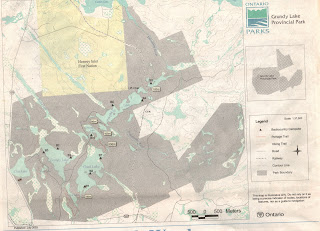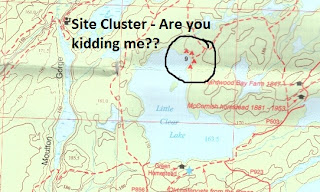Location: 70 km North of Napanee
Thoughts: I like Bon Echo as a park, given its natural beauty, the big rock, the pictographs and its proximity to major urban centres. However, that's also the reason you can't find a car camping site here in July and August (even though it has 528 car campsites, which is large by Ontario standards). On top of that, most of the car camping in this park is beyond terrible. So to enjoy this park, I opt for the less popular Joeperry Lake. But one year, my regular camping companions and I thought we'd try something new in Bon Echo, the even less popular Abes & Essens Backpacking sites. I'm sure you'll have no problem booking these, no matter what time of year. They're not extraordinarily difficult to get to, but the hike is probably beyond the imaginings of "weekend fun in the outdoors" for most Bon Echo campers.
There are two sites within a reasonable trek from the trailhead, both of which are at Essens lake. Our site at Essens was a swampish pond of a lake, with bugs to match. The lake is just really small and mucky. We tried to scoop some water that we could filter and drink, but found whatever we scooped up was black with silt and organic matter. I don't know if you could have even settled the stuff out, this water was really thick. There were also plenty of leeches to keep us company on our swims. The site itself was on a bit of a slope, but there was a reasonably flat stretch to pitch the tent.
For its scenic value, the Abes/Essens trail is not worth the effort. Even the park's literature describes the sights as "intriguing"; that doesn't strike me a strong endorsement, considering the hyperbole that's generally infused into park publications. Admittedly, the camping was at least peaceful; not a single person in the park thought it would be a good idea to hike this trail, even in peak season. We didn't see another soul the entire weekend. So if you want solitude, you'll find it at Essens Lake. And I'm willing to bet you'll find greater solitude at Abes Lake, given the distance that has to be covered to get to the sites there. Frankly speaking, the hiking trail that loops around Essens doesn't have much to offer in the way of scenery, perhaps that changes when you get up to Abes. But I have my doubts and I don't know if its would be worth the effort to ever find out.
Addendum: Judging from this interesting hiking log, the trip up to Abes is not worth your time.
Website: Ontario Parks
Map: Google Maps
Camping Facilities: Backcountry (hike-in only)
Grade: C+
Stargazing: Excellent
Summary: An uneventful, rugged hike leading to forgettable, swampy lakes. Better off going to Joeperry/Pearson
Stargazing: Excellent
Summary: An uneventful, rugged hike leading to forgettable, swampy lakes. Better off going to Joeperry/Pearson
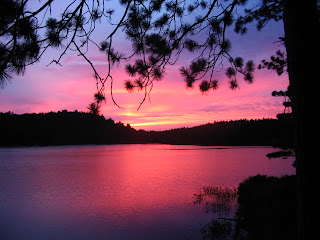 |
| View of Essens Lake at sunset |
 |
| View from a campsite on Essens lake - note: swampy |
There are two sites within a reasonable trek from the trailhead, both of which are at Essens lake. Our site at Essens was a swampish pond of a lake, with bugs to match. The lake is just really small and mucky. We tried to scoop some water that we could filter and drink, but found whatever we scooped up was black with silt and organic matter. I don't know if you could have even settled the stuff out, this water was really thick. There were also plenty of leeches to keep us company on our swims. The site itself was on a bit of a slope, but there was a reasonably flat stretch to pitch the tent.
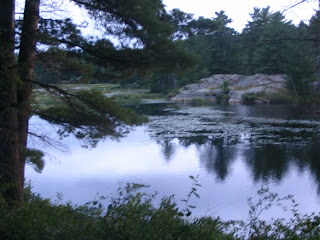 |
| More swampiness on Essens |
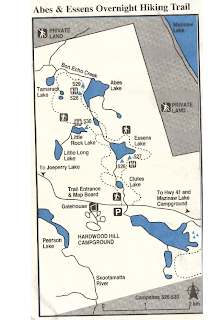 |
| Abe-Essens Trail Map (Source: Bon Echo Park Tabloid, 2008) |
